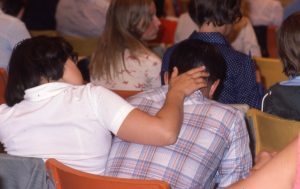HOMILY WEEK 09 04 – Year II
Love and Do What You Will
(2 Tim 2:8-15; Ps 25; Mk 12:28-34)
******************************************
How well are you able to love yourself? Are you struggling with low self-worth? Do you realize you might daily be breaking one of the commandments of Jesus?
The way out is to listen to today’s psalm and learn the way of the Lord – which is to keep the Great Commandment to love.
 To do so is to be able to follow the teaching of St. Augustine – love and do what we will. That is possible because if we truly love, we will want to do only what is God’s will.
To do so is to be able to follow the teaching of St. Augustine – love and do what we will. That is possible because if we truly love, we will want to do only what is God’s will.
The teaching of Jesus in today’s gospel is very clear. It is God’s will that we love God with our whole being, and all others as we love ourselves.
The first part of this commandment was very familiar to the Jewish people. To love God with our whole being is the Great Shema of Judaism (Deuteronomy 6:4-9) given by Moses to the people convened before him, by which God charged them to, “… bind them as a sign on your hand, fix them as an emblem on your forehead, and write them on the doorposts of your house and on your gates.”
 Some take this literally. In the Toronto airport en route to Palestine, I saw an orthodox Jew wrap a leather thong around his arm as he recited his prayers. At the Western Wall in Jerusalem, I witnessed an orthodox Jew wrapping a leather thong around the arm of a tourist, lift up his baseball cap, and place a square amulet on his forehead!
Some take this literally. In the Toronto airport en route to Palestine, I saw an orthodox Jew wrap a leather thong around his arm as he recited his prayers. At the Western Wall in Jerusalem, I witnessed an orthodox Jew wrapping a leather thong around the arm of a tourist, lift up his baseball cap, and place a square amulet on his forehead!
What was not so familiar to the Jewish people of Jesus’ time was the second part of that commandment, taken from an obscure law hidden among the plethora of other laws in Leviticus (Leviticus 19:18) which reads, “but you shall love your neighbor as yourself: I am the Lord.” Jesus took this easily ignored law from the Old Testament and placed it side by side with the Great Shema of Judaism, basically equating the two.
This meant that for Jesus, to love our neighbor as we love ourselves is just as important as Great Shema – loving God with our whole being. That was shocking, and totally new. No one had ever done that before. Yet that very teaching becomes the heart of the new commandment Jesus gave his followers, a teaching St. Paul took to heart as we read in the first reading: “suffering hardship, to the point of being chained like a criminal.” Daring as Paul was, he even went a step further in Galatians 5:14, declaring the last part of this commandment fulfills the first: “For the whole law is summed up in a single commandment, ‘You shall love your neighbor as yourself.’” For Paul, this commandment may even be the best way to love God.
To love our neighbor is fairly clear – treat others fairly, forgive them their failings, try to understand them, affirm and encourage them, do good to them, trust them and share life with them. What is very disturbing, however, is how some people can think they are doing this through devotions yet treat someone they don’t like very harshly. The saying, “Would that we could see ourselves as others see us,” applies here.
What is more challenging, however, is to love ourselves. That is perhaps where we fail the most. Many of us have a hard time accepting ourselves as we are, beat ourselves up for our past mistakes, refuse to forgive ourselves, reject compliments from others, and find it easier to love others than to love ourselves. At one low point in my life, a friend told me, “Your refusal to forgive yourself is worse than anything you have ever done!” That shocked me out of my self-deprecating mood and actually changed my life at that time. All of this may be part of the inspiration for the book I am currently writing on self-awareness and learning to love ourselves.
Rarely has anyone come to me over all my years of ministry to admit that their greatest sin was, “I don’t love myself.” During one mission, a diminutive looking woman came to talk. She had been sexually abused as a child, was in an abusive marriage, and shared with me she was a “non-person, a nobody.” The only thing that was keeping her going was she had a key to the church and came in each day to pray before the Blessed Sacrament. I felt for her and tried to encourage her – at least she was naming her reality, sharing it with another person, and just maybe in that small way, starting to love herself. I gave her Isaiah 43:1-4 to pray with, a passage given to me by my spiritual director that started my healing journey as a young Oblate seminarian.
The Eucharist is a powerful experience of God’s love through forgiveness and healing, and a wonderful way to love God back. It is also an opportunity to love ourselves as we admit our need for forgiveness and help, and at the dismissal we are commissioned to go and love others as Jesus has loved us.
May our celebration empower us to believe in God’s love for us, love God back with our whole being, love others as best we can, and above all, remember to love ourselves. Then, we will be truly able to live that teaching of St. Augustine – love and do what we will.




It is a beautiful homily about performing and living out the new Commandment. We should know about God’s love ; which is love to love one another as we love ourselves. We are to love our neighbours as ourselves. Also , loving our enemies because we forgave them for their faults. It does not mean we have to like them. This is the most challenging part for most people because they don’t want to deal with all the pain and suffering by confronting their enemies. They still have the grudge, anger ,bitterness and resentments over the other person and it would take over their lives. If we don’t resolve the situation it will not go anywhere and we will not be healed. If we have,unfinish business we not be forgiven and gain God’s love. So, we must learn to let go all our sins and negative thoughts towards ourselves and other people. We are understand what is love , God’s love ; to love one another as we love ourselves. Loving our enemies by forgiving them. Finally, we are to love God with our whole being by praise and worship him fully. Amen. Thanks be to God.
Well thank you Bishop Sylvain Lavoie for the beautiful and encouraging words . It is very uplifting and we can feel the love. These are great stories for people going through 12 step program or certain programs. Gracias! Merci! God bless ! ??????????????